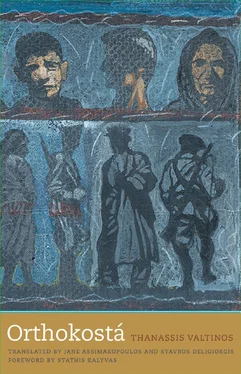Thanassis Valtinos
Orthokostá
FOREWORD by Stathis N. Kalyvas
Thanassis Valtinos’s Orthokostá opens with a brief description of a village in flames. Where are we? Why is this village burning? And why should we care?
Here is a book based on a series of oral recollections that are stitched together into a fragmented, potentially confusing narrative. The reader is quickly assaulted by a profusion of personal and place names, and the narrators confuse dates, contest events, and stress ostensibly extraneous details. Indeed, it is this fragmented and multifaceted style that makes the narrative so compelling but at the same time so challenging. Hence the necessity of geographical and historical context.
We quickly find out that we are in the district of Kynouria, one of three in the province of Arcadia, which makes up the core of the Peloponnese in Greece. This large peninsula, at the southern end of the Balkans, carries a powerful historical charge, associated with the famous war between Greek city-states that took place between 431 and 404 B.C.E. and was immortalized by Thucydides as the Peloponnesian War. More recently, in the 1820s, the modern Greek state grew out of an uprising that took place primarily in that region. The events described in Orthokostá take place at yet another critical historical moment, the 1940s.
The village in question was destroyed in the summer of 1944, when Greece was undergoing a ruthless occupation. Many mountain villages had been targeted by a brutal counterinsurgency campaign, carried out by German troops along with their local allies, who were generally known as Security Battalions. Opposing them was a Resistance guerrilla army, the Greek Popular Liberation Army (ELAS), the largest such group in Greece and under the control of the Communist Party of Greece, via a front organization known as the National Liberation Front (EAM). As a result of this conflict thousands of innocent peasants died and hundreds of villages went up in flames.
At the center of the book is a village named Kastri, Valtinos’s ancestral village, along with a constellation of smaller neighboring villages: Ayia Sofia, Karatoula, Mesorrahi, Oria, Rouvali, and Eleohori, this last farther away but closely connected to Kastri. A multitude of other places appear, including the town of Tripolis, capital of Arcadia, and Athens.
It soon becomes apparent in the novel that Kastri was destroyed not by German troops, as one might have expected, but by ELAS, which also had set up one of its detention camps for local civilians in a nearby monastery known as Orthokostá. In fact, many of the book’s narrators had been imprisoned and tortured there. The realization that the culprits of these atrocities are Greek Resistance fighters rather than Nazi occupiers comes as a shock and goes a long way toward explaining the book’s impact in Greece’s intellectual circles at the time of its publication in 1994. Orthokostá showcases two of the most controversial, delicate, and until recently suppressed aspects of World War II in Greece: the dark side of the Resistance and the collaboration’s grassroots dimension. Orthokostá is an account of the vicious internecine Civil War that ravaged Greece during the Occupation, setting neighbors against one another.
Valtinos’s political and literary credentials among left-leaning intellectuals were such that Orthokostá could not be ignored or dismissed. It attracted considerable attention and critical acclaim. At the same time, however, it also became the target of harsh criticism by a small but vocal minority who accused him of seeking to tarnish the image of the Resistance. The novel’s impact went beyond the literary realm to inform debates about public history and collective memory.
To understand why this was so, we should start with a key observation: the main events structuring the stories told throughout the book (the formation of the Security Battalions, the destruction of Kastri, and so on) are real, even though their recounting is highly personal, reflecting each narrator’s distinct experience and bias as processed through Valtinos’s unique prose. Indeed, at one point a female narrator tells her husband: “Don’t say anything you shouldn’t.” These events are also broadly representative of a range of similar processes that took place during this period across the Peloponnese and in other regions of Greece, particularly in Macedonia, in northern Greece. In these areas, a grassroots armed movement emerged in 1944 to challenge EAM and ELAS, spurring a bloody civil war that went through a variety of forms and permutations, ending only in 1949.
How did we get there? In April 1941 Greece was overrun by Nazi Germany, after having successfully resisted an Italian invasion that began in October 1940. What followed was a triple occupation of the country by Germany, Italy, and Bulgaria — which effectively became a German occupation after Italy capitulated in the autumn of 1943. As in many other European countries conquered by Germany and its allies (as well as many Asian countries conquered by Japan), the Occupation was both brutal and vigorously contested. As the war went on, and Germany’s prospects began to dim, Resistance groups emerged throughout Greece to challenge the Axis rule. Initially clandestine, urban, and focused on intelligence gathering and sabotage, the Resistance quickly grew into full-fledged rural insurgencies. Britain was instrumental in encouraging them with financial and military assistance. In particular, Greece and Yugoslavia were priority areas for Britain, and the Special Operations Executive (SOE) was tasked with spurring a “partisan” war in both countries. An unintended effect was the spectacular rise of Communist insurgencies.
Relying on Greece’s rough mountain terrain, vigorous patriotic feeling, and tradition of irregular warfare and rural banditry, various guerrilla bands began to emerge starting in 1942. They quickly coalesced into two rival groups, one headed by the Communist Party and the other by demobilized officers of the Greek Army. The Communist-led EAM was more centralized, disciplined, and coordinated than the nationalist bands, and it relied on the strong organizational know-how of its cadres, who had amassed considerable experience through years of clandestine political action. As a result, by the end of 1943, the Communists had destroyed the competition and came to dominate the Resistance. The defeat of the nationalist guerrilla bands in the Peloponnese is recounted by several narrators, most notably in chapters 4, 42, and 44.
The Communist takeover of the Resistance in what was a first instance of civil conflict within the Occupation gave rise to a paradox: villages dominated by a traditionalist, property-owning peasantry found themselves ruled by the Communist Party, a group that had been marginal in Greece’s mountain hinterland until then. This paradox was especially pronounced in the Peloponnese, where many peasants had to be coerced into joining EAM and ELAS. Most complied, but several resisted (see, for example, the accounts in chapters 16 and 26). Thus, a second paradox: the emergence of a resistance against the Resistance.
Communist coercion and the opposition it led to suffuse the bulk of the narratives. In this way, Orthokostá provides a powerful counterpoint to the much better-known account of a quasi-universal, patriotic resistance against Nazi rule in Greece, and the concomitant description of the repression suffered by the left. Indeed, this is a doubly transgressive account. It sheds light on the dark side of the Greek Resistance, which had been airbrushed to emphasize its heroic dimension, and it brings to the surface the real dimensions of collaboration, and its causes, that had been minimized or even suppressed by both its supporters and foes.
Читать дальше


